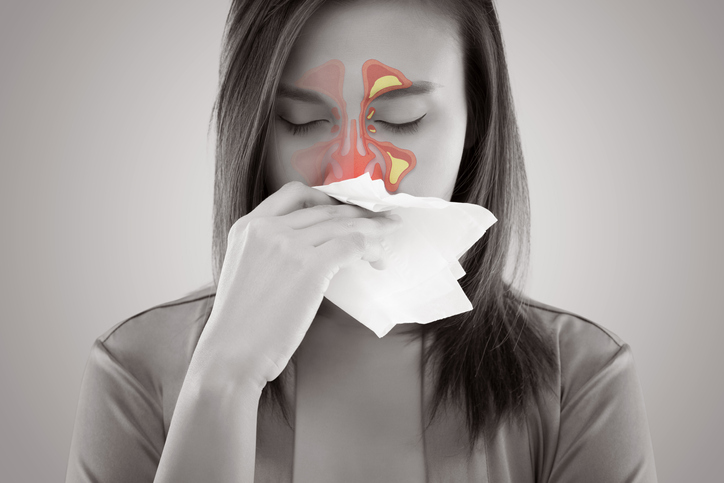A sinus infection (also called sinusitis) can bring discomfort, pain, and frustration. You might suffer from pain or pressure in your face, cold-like symptoms, a fever, or a cough. It might feel like a cold, and with such similar characteristics, you may wonder if you pose a risk of infecting others around you. Essentially, sinus infections can sometimes be contagious but it comes down to the cause of the infection, which can be difficult to determine. That’s why seeking medical advice from your local ENT Beverly Hills doctor can help. Before you make the call, let’s look into what a sinus infection entails and whether yours may or may not be contagious.
What is a Sinus Infection?
Sinuses are air pockets located throughout your face; They can be found in the forehead, between the eyes, behind the nose, and behind the cheeks. When your sinuses become filled with mucus (which can be exacerbated by a recent cold, smoking, allergies, or other factors), they can become inflamed and unable to drain, which can lead to the fluid becoming infected.
This is when a sinus infection can occur, which can be accompanied by the following symptoms, usually for up to 10 days:
- Drainage down the back of your throat (post-nasal drip)
- A stuffy or runny nose
- Pain or pressure in your face, particularly your eyes, forehead, nose, and cheeks
- Headaches
- Coughing
- Fever
What Causes a Sinus Infection?
The main culprit that causes a sinus infection is a virus, which can then develop into a cold. This is very common, as the excess mucus and swelling of the sinuses you get with a cold are the perfect recipe for a sinus infection. In short, the infection itself won’t be contagious to others, however the cold that caused your symptoms can be passed along. People may be affected differently by a cold, so a sinus infection isn’t a guaranteed outcome.
Bacteria is another cause of a sinus infection. When fluid builds up in the sinuses, a bacterial infection can occur, leading to bacterial sinusitis. This type of infection isn’t contagious, but it’s important to seek medical care if your symptoms last more than two weeks.
Allergies can cause chronic sinusitis as well, which can last upwards of three months. This type of sinus infection is not contagious either. You can be especially susceptible to sinusitis if you smoke, live in a dry or polluted climate, or have a deviated septum.
A Cold vs. Sinusitis
The difference between a cold and sinus infection can be difficult to differentiate, as both can make you feel unwell and cause facial pain, fever, coughing, a runny or stuffy nose, and headaches. One way to tell is by the length of your symptoms, as colds don’t often last longer than 10 days in adults, whereas sinusitis can occur for up to two weeks (and sometimes longer). Another telltale sign is if your mucus appears green or yellow in color, which may be an indicator of a sinus infection.
Treatments for a Sinus Infection
You usually won’t need any medical treatment for a sinus infection, unless it progresses or lasts for longer than two weeks. Your doctor may provide nasal spray, a decongestant, or pain relief to make your symptoms more manageable as they monitor the progress of your infection. They may prescribe antibiotics if your infection persists, but only if it’s absolutely necessary, due to the potential of developing antimicrobial resistance (AMR), which is when bacteria and viruses evolve to no longer become responsive to medicine.
How Long is Sinusitis Contagious?
If you’ve been infected by a virus, you may be contagious for as long as anywhere from a few days to a week, and sometimes longer. Usually, a virus can be spread days before any symptoms have set in (known as the incubation period), which makes it difficult to protect others from catching it. Luckily, you’re very unlikely to become sick from the same virus twice in a short period of time, so there’s no worries about passing the same cold back and forth between two people.
How to Keep Yourself and Others from Getting a Sinus Infection?
Viruses spread like any flu or cold; through the air, expelled droplets, or contact to your face with an infected surface. The best way to stay healthy is by washing your hands regularly, avoiding touching your face, and not sharing food and drinks. If you become sick, the same rules apply but you can help protect others by keeping your distance, covering your mouth with your inner elbow when you cough or sneeze, and disinfecting the surfaces you touch.
You can also minimize your likelihood of developing a sinus infection by avoiding smoking, eating immunity-boosting and antibacterial foods, and staying up to date on your vaccinations. Because everyone reacts differently to colds, there is no guarantee that if you pass a virus to somebody else they will develop sinusitis, whereas others might.
What to Do if You Get a Sinus Infection
There are several remedies to ease the symptoms of a sinus infection.
- Get plenty of rest – this is key for fighting any illness
- Drink lots of fluids
- Use a humidifier to help with breathing
- Take hot showers or lean over a bowl with steaming water and breathe in
- Use saline nasal sprays
- Take ibuprofen to ease pain and swelling
- Place a warm compress on your face to help with sinus pain and inflammation
These should be used for the short-term only, and if your symptoms get worse or don’t alleviate after 10 – 14 days, contact your medical provider for help.
ENT Doctor Beverly Hills
Dr. Richardson is an ENT Beverly Hills specialist with over 40 years of experience in the field. If your sinus infection isn’t healing, you’ve had a fever for more than three days, or if your symptoms are worsening, Dr. Richardson can help. Give us a call today at (310) 360-9520 or get in touch through our online portal to schedule an appointment.

